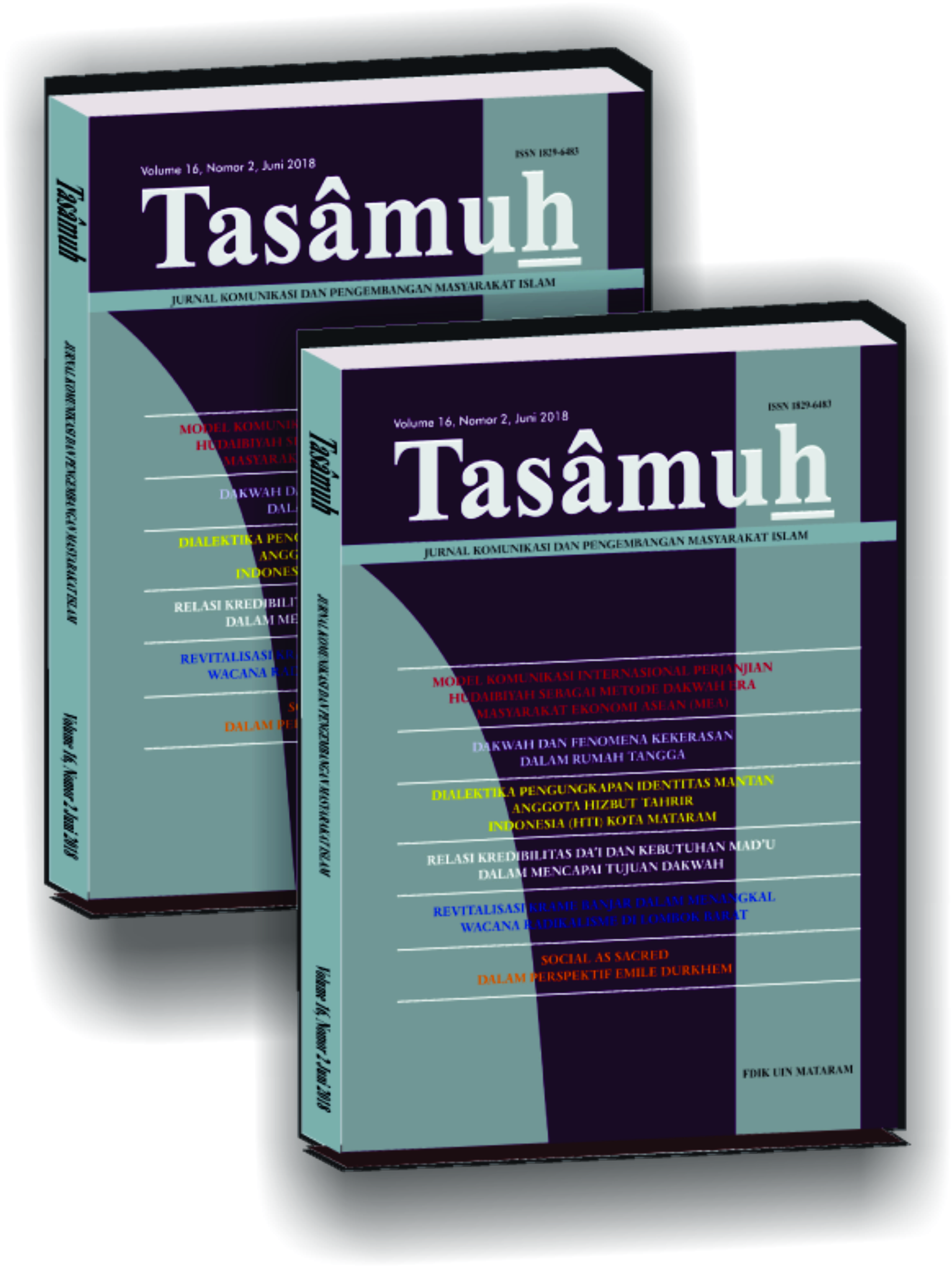Contemporary Da'wah and Response to the Ecological Crisis: Integrating Islamic Values and Environmental Awareness
DOI:
https://doi.org/10.20414/tasamuh.v23i1.12750Keywords:
Contemporary Da'wah, Ecological Crisis, Environmental Awareness, Islamic ValuesAbstract
This paper examines the role of contemporary da'wah in responding to the ecological crisis that has become a global challenge in the 21st Century. By referring to Islamic values that view humans as khalifah on earth, this research highlights the importance of integrating Islamic theological principles with ecological awareness to foster a robust environmental conservation ethic. The da'wah approach developed is directed to be relevant and contextual to the socio-cultural conditions of Muslims today so that the message of environmental sustainability does not only become an abstract idea but is implemented in the form of commitment and real action. Through literature studies and content analysis of various da'wah materials that address environmental themes, this study found that da'wah strategies that combine religious values and ecological awareness can collectively foster moral orientation and environmentally friendly behavior. The research recommends the development of innovative and collaborative da'wah methods that utilize digital media and social networks to expand the reach and impact of the Islam-based environmental conservation movement.
Downloads
References
Aggarwal, Narendra. Environmental Challenges and Solutions. Green Press, 2018.
The Qur'an. The Qur'an with English Translation and Commentary, Translated by Abdullah Yusuf Ali, Amana Publications, 2004.
Anwar, Ahmad. "Integrative Approaches in Contemporary Islamic Da'wah." Journal of Islamic Studies, vol. 23, no. 1, 2022, pp. 10-25.
Bernard, H. Russell. Research Methods in Anthropology: Qualitative and Quantitative Approaches. 5th ed., AltaMira Press, 2011.
Bowen, Glenn A. "Document Analysis as a Qualitative Research Method." Qualitative Research Journal, vol. 9, no. 2, 2009, pp. 27-40.
Braun, Virginia, and Victoria Clarke. "Using Thematic Analysis in Psychology." Qualitative Research in Psychology, vol. 3, no. 2, 2006, pp. 77-101.
Creswell, John W. Qualitative Inquiry and Research Design: Choosing Among Five Approaches. SAGE Publications, 2013.
Denzin, Norman K. The Research Act: A Theoretical Introduction to Sociological Methods. 3rd ed., McGraw-Hill, 1978.
Esposito, John L. Islam, and Ecology: A Bestowed Trust. Oxford University Press, 2019.
Esposito, John L. Islam, and Ecology: A Bestowed Trust. Harvard University Press, 2009.
Foltz, Richard C. "Islamic Environmentalism: An Introduction." Islamic Studies Quarterly, vol. 54, no. 1, 2020, pp. 10-28.
Foltz, Richard C. Environmentalism in Islam. University of Georgia Press, 2003.
Flick, Uwe. An Introduction to Qualitative Research. 5th ed., SAGE Publications, 2014.
Hassan, Farid. "Communicative Strategies in Ecological Da'wah." Al-Tahrir Journal of Islamic Communication, vol. 8, no. 2, 2023, pp. 20-35.
Hesse-Biber, Sharlene Nagy, and Patricia Leavy. The Practice of Qualitative Research. 3rd ed., SAGE Publications, 2011.
Ibrahim, A. R. "Theological Foundations of Ecology in Islam." Journal of Theology and Environment, vol. 17, no. 2, 2021, pp. 30-40.
Ibrahim, Musa. Challenges in Islamic Environmental Da'wah. Dar al-Salam, 2020.
Kamal, Muhammad. "Reframing Da'wah: Beyond Ritual and Ethics." The Muslim World Journal, vol. 14, no. 1, 2022, pp. 8-18.
Kawulich, Barbara B. "Participant Observation as a Data Collection Method." Forum Qualitative Sozialforschung / Forum: Qualitative Social Research, vol. 6, no. 2, May 2005.
Krippendorff, Klaus. Content Analysis: An Introduction to Its Methodology. 3rd ed., SAGE Publications, 2012.
Leal, Maria. "Cultural Barriers in Ecological Awareness in Muslim Communities." Global Environmental Sociology, vol. 12, no. 3, 2021, pp. 240-255.
Lincoln, Yvonna S., and Egon G. Guba. Naturalistic Inquiry. SAGE Publications, 1985.
Malik, Sami. "Climate Change and Collective Islamic Responsibility." Journal of Environmental Ethics, vol. 10, no. 1, 2022, pp. 15-25.
Maxwell, Joseph A. Qualitative Research Design: An Interactive Approach. 3rd ed., SAGE Publications, 2013.
Nasr, Seyyed Hossein. Islam and the Environmental Crisis. ABC Publishing, 2018.
Nasr, Seyyed Hossein. Man and Nature: The Spiritual Crisis of Modern Man. ABC International Group, 1997.
Patton, Michael Quinn. Qualitative Research & Evaluation Methods: Integrating Theory and Practice. 4th ed., SAGE Publications, 2015.
Qureshi, Abdul. "Da'wah and Environmental Consciousness: Integrative Strategies." International Journal of Islamic Thought, vol. 5, no. 1, 2023, pp. 25-35.
Rahman, Zain. "Practical Solutions in Islamic Ecological Da'wah." Journal of Contemporary Islamic Studies, vol. 20, no. 1, 2023, pp. 7-16.
Rubin, Herbert J., and Irene S. Rubin. Qualitative Interviewing: The Art of Hearing Data. 3rd ed., SAGE Publications, 2012.
Saniotis, Arthur. "The Role of Islamic Da'wah in Environmental Awareness." Environmental Communication Review, vol. 29, no. 4, 2021, pp. 810-820.
Smith, Jane I., and Yvonne Y. Haddad. Islamic Environmentalism: Activism in the United States and Beyond. Cambridge University Press, 2018
Stern, Paul C. "Environmental Challenges in the 21st Century: The Role of Religion." Ecology and Society Journal, vol. 22, no. 3, 2017, pp. 400-420.
Yusuf, Dr. Hakim. "Sustainable Development and Islamic Approaches." Journal of Muslim Civilization Studies, vol. 16, no. 2, 2019, pp. 50-60.
Zainuddin, Hadi. "Digital Media and Contemporary Islamic Da'wah." Journal of Media and Religion, vol. 14, no. 1, 2022, pp. 25-40.
Downloads
Published
How to Cite
Issue
Section
License
Copyright (c) 2025 TASAMUH : Jurnal Komunikasi dan Pengembangan Masyarakat Islam

This work is licensed under a Creative Commons Attribution-ShareAlike 4.0 International License.
Authors who publish with this journal agree to the following terms:
- Authors retain copyright and grant the journal right of first publication with the work simultaneously licensed under a Creative Commons Attribution License that allows others to share the work with an acknowledgement of the work's authorship and initial publication in this journal.
- Authors are able to enter into separate, additional contractual arrangements for the non-exclusive distribution of the journal's published version of the work (e.g., post it to an institutional repository or publish it in a book), with an acknowledgement of its initial publication in this journal.
- Authors are permitted and encouraged to post their work online (e.g., in institutional repositories or on their website) prior to and during the submission process, as it can lead to productive exchanges, as well as earlier and greater citation of published work.







